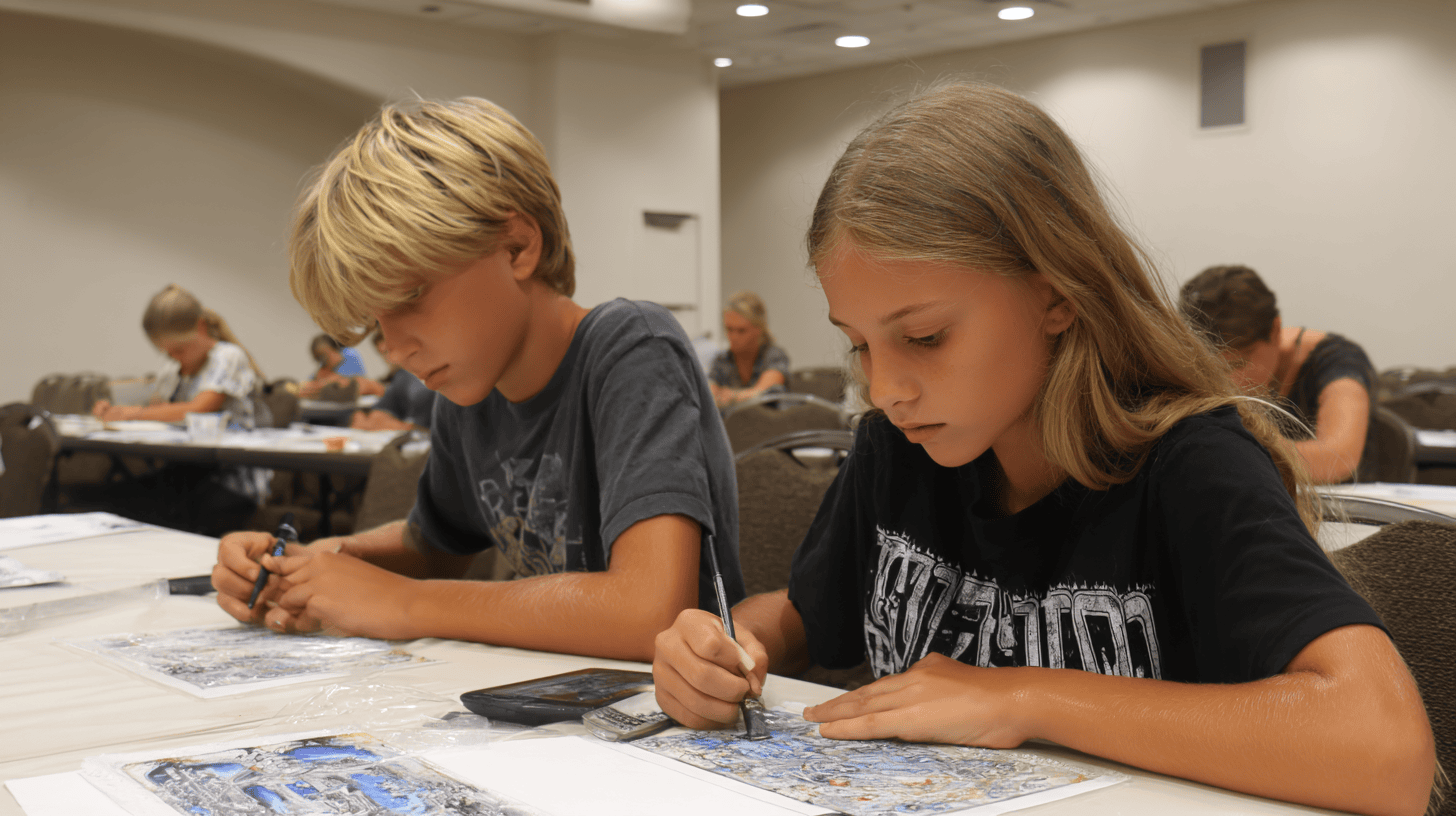Summer shouldn’t just start and end with pool parties and backyard cookouts. For kids, it can be a springboard of curiosity and widening horizons. It’s a time when they’re free from the pressure of standardized tests and rigid schedules, finally able to lean into the kinds of learning that don’t feel like school at all.
For kids aged 6 through 12, these precious weeks can mark the beginning of a lifelong interest in robotics, medicine, architecture, painting, writing, or even ecological stewardship.
For physicians raising curious, high-capacity kids, summer is an opportunity to feed both their intellect and imagination. But not every camp cuts it. The best ones are built for joy, not rote memorization. They prioritize wonder over worksheets, and they spark the kind of self-driven exploration that no classroom can replicate.
Let’s take a look at some of the most compelling summer options for kids in the U.S. Not just top-tier STEM intensives, but also creative and character-building experiences that can help shape well-rounded future leaders.
(Side note: While registration for some of the programs below may have closed by the time you see this, it’s still worthwhile to learn what they offer and keep them in mind for future summers.)
1. iD Tech Camps (Multiple Locations)
Image Source: iDTech
iD Tech Camps are some of the most recognizable tech-focused camps in the country – and for good reason.
Hosted at more than 75 prestigious university campuses like MIT, Stanford, and Carnegie Mellon, these programs give kids hands-on experience in coding, game design, robotics, and AI.
Designed for children ages 7 through 17, the curriculum includes coding tools and academic mentorship. Campers are grouped by skill level and receive individualized attention thanks to small instructor-to-student ratios. The instructors often come from top-tier academic institutions and bring a wealth of advanced, forward-thinking expertise to each session.
What sets iD Tech apart is the opportunity for kids to leave with tangible projects and a newfound confidence in navigating the digital world. The combination of creative freedom and academic rigor gives kids a running start in any future STEM endeavor.
2. MIT DynaMIT (Cambridge, MA)
Image Source: DynaMIT
DynaMIT is a no-cost, weeklong camp hosted by MIT that targets middle schoolers with a passion for inquiry and innovation.
Designed for students ages 11 to 14 from underserved communities, the program is run entirely by MIT undergraduates who develop original, interdisciplinary curricula.
Participants take on collaborative design challenges, guided experiments, and interactive discussions that link science to real-world issues like sustainability and social equity.
Activities include building water filtration systems, designing assistive technology devices, and solving logistical puzzles rooted in engineering and environmental science.
DynaMIT isn’t just academically stimulating; it also cultivates moral imagination, encouraging kids to use their intellect in service of something larger than themselves. It’s a prestigious entry point into the world of science for those who may not otherwise have access.
3. Georgia Tech CEISMC Summer PEAKS (Atlanta, GA)
Image Source: Georgia Tech
Georgia Tech’s Summer PEAKS (Programs for Enrichment and Accelerated Knowledge in STEM) offers a variety of theme-based camps tailored for ages 7 to 17.
These weeklong sessions are centered on real-world applications and include topics like aerospace engineering, biomedical devices, robotics, and computer science.Campers work with actual research tools and engage in problem-solving challenges that simulate professional lab work.
The staff includes university professors, PhD students, and engineering professionals who guide participants through hands-on activities such as coding simple AI, dissecting electronic circuits, or constructing scale models of prosthetic limbs.
What distinguishes PEAKS is its focus on inquiry-based learning and blending theoretical knowledge with experimentation and iteration.
For curious minds who thrive on building, testing, and improving, this program serves as a kinetic classroom of the future.
4. Stanford seeME (Stanford, CA) 
Image Source: Stanford seeME
Stanford’s seeME is a highly selective, tuition-free initiative aimed at underrepresented middle school and high school students.
The one-day program offers discovery-based learning in fields like robotics, environmental science, and mechanical engineering.
Students work in teams to tackle complex problems, guided by mentors who are Stanford students and alumni. The experience is further enriched by site visits, guest speakers, and a community of like-minded peers.
One of the program’s defining features is its emphasis on mentorship and representation. By connecting students with role models from similar backgrounds, seeME helps participants envision a place for themselves in fields where they’ve historically been underrepresented.
It’s more than an event, it’s a catalyst for future scientific ambition and social impact.
5. Veritas AI Trailblazers (Virtual)
Image Source: Veritas AI Trailblazers program brochure (PDF)
Veritas AI’s Trailblazers program is one of the few machine learning camps specifically designed for middle school students.
It’s a virtual program that targets highly motivated learners aged 11 to 13, introducing them to the foundational concepts of artificial intelligence, including deep learning, sentiment analysis, and neural networks.
The instruction is provided live by Harvard, Columbia, and Stanford alumni and is supplemented by small-group sessions. The course culminates in a capstone project where students develop their own AI models, often building chatbots, image classifiers, or algorithmic game engines.
With hands-on access to Python, kids learn how to navigate sophisticated tech ecosystems usually reserved for high school and college students.
The program’s intellectual rigor is balanced with creativity and practical application, making it ideal for prodigiously curious kids who want to stretch their potential.
6. NYU Science of Smart Cities (New York, NY)
Image Source: NYU
The NYU Science of Smart Cities program immerses children aged 12 to 14 in the systems that make cities tick.
Offered through the NYU Tandon School of Engineering, the camp explores urban challenges and sustainable solutions through a blend of science, engineering, and civic education.
Students learn about energy grids, transportation systems, clean water infrastructure, and waste management through the lens of real-life problem-solving scenarios.
Students take part in a mandatory and interactive program called ‘Irondale,’ led by professional theater educators. Through a creative mix of improvisational exercises, they strengthen their public speaking and communication abilities, bringing a dynamic and imaginative element to their learning experience.
By the end of the camp, participants develop a macro-level understanding of how human ingenuity shapes the environments we live in.
For kids drawn to large-scale thinking and public impact, this is an ideal launching pad.
7. Sitka Fine Arts Camp (Sitka, AK)
Image Source: Sitka Fine Arts Camp
Situated on the breathtaking coastline of Alaska, the Sitka Fine Arts Camp offers a one-of-a-kind artistic haven for middle school and high school kids.
Known for its interdisciplinary approach, Sitka blends formal instruction with wild inspiration. Students rotate through classes in music, theater, dance, visual arts, yoga, and pottery.
A child could spend one-day mastering acrylic painting techniques and the next day composing a chamber piece or learning stage combat.
The faculty is composed of professional artists and educators who emphasize both skill development and expressive authenticity.
Campers live on a college campus, participate in group performances, and develop a strong sense of community.
Sitka doesn’t just aim to discover talent, it aims to nurture it with care, sincerity, and joy.
8. Farm and Wilderness Camps (Plymouth, VT)
Image Sourec: Farm & Wilderness
These rustic, tech-free camps in Vermont offer a powerful antidote to screen-saturated childhoods.
Open to a wide range of children from age 4 all the way up to age 17, Farm & Wilderness camps emphasize environmental stewardship, communal living, and self-sufficiency.
Daily activities include hiking, canoeing, organic farming, carpentry, and animal care. Campers take turns cooking, cleaning, and leading group activities, all within a value system rooted in Quaker values.
Instead of structured classes, learning happens organically through experience, reflection, and storytelling. Children are encouraged to express themselves, connect with nature, and take responsibility for the well-being of their camp community.
It’s not uncommon for campers to return year after year, forming lifelong bonds and carrying the camp’s ethos into adulthood.
9. Cheley Colorado Camps (Estes Park, CO)
Image Source: Cheley
Founded over a century ago, Cheley Camps in Colorado provide a classic, high-altitude adventure steeped in tradition.
Similar to Farm & Wilderness camps, these camps also cater to kids aged 9 to 17. Cheley’s curriculum includes horseback riding, backpacking, technical climbing, riflery, mountain biking, and outdoor survival skills.
But it’s the program’s reflective framework, like campfire storytelling, values-based goal setting, and community leadership, that sets it apart. Campers are expected to push physical boundaries and engage in emotional growth, learning grit, perseverance, and empathy along the way.
The Rockies provide a majestic backdrop, reinforcing lessons in resilience and respect for the natural world. I would call this the quintessential American summer camp, built to forge capable, thoughtful individuals.
10. Black Rocket Tech Camps (Multiple Locations and Virtual)
Image Source: Black Rocket
Black Rocket Tech Camps specialize in turning digital enthusiasm into creative skill.
Designed for ages 6 to 17, these camps blend coding, storytelling, and entrepreneurship in both online and in-person settings.
Kids can create Roblox worlds, design mobile apps, animate with Adobe Suite, or launch YouTube channels, all with structured guidance. The instructors emphasize creative autonomy and problem-solving, ensuring that each camper walks away with a finished product and the confidence to build more.
Beyond technical skills, the program fosters an entrepreneurial mindset, teaching children how to brand and market their creations. Black Rocket is particularly well-suited for kids who want to move from passive media consumption to active innovation.
11. The Lumiere Junior Explorer Program
Image Source: Lumiere Education
For middle schoolers with a genuine spark for research and intellectual exploration, the Lumiere Junior Explorer Program offers a rare chance to work one-on-one with world-class mentors.
Aimed at highly motivated students, this virtual program pairs participants with researchers from top universities, including Harvard, Yale, and MIT, for personalized academic projects across a wide range of disciplines.
Whether it’s bioethics, climate policy, computer vision, or behavioral economics, students dive deep into graduate-level ideas with support tailored to their pace and interests.
Throughout a 12-week guided research process, kids are not only introduced to advanced content but also coached in how to develop a coherent thesis, synthesize sources, and present their findings.
The outcome is a fully realized research project, sometimes culminating in submission to middle school-level journals or competitions.
For families seeking not just a camp but a true intellectual apprenticeship, Lumiere delivers a level of academic mentorship that’s rarely accessible at this age.
Final Thoughts
Physician-parents know better than most: time is a finite (and precious) commodity. And when it comes to childhood, those summers slip away faster than expected.
Choosing the right summer program means giving your child more than a way to pass the time; it means investing in curiosity, resilience, and lifelong joy.
Whether your child wants to design a robot, perform Shakespeare, or learn how to build a fire from scratch, there’s a camp out there worthy of their potential, and yours.
If you’ve discovered a summer program that left a lasting impression on your child, we’d love to hear about it. Are there hidden gems we missed, such as local camps, under-the-radar programs, or unique experiences that deserve more recognition? Share your stories in the comments below.
They just might help another family find the perfect place for their child to explore, create, and grow this summer.






















